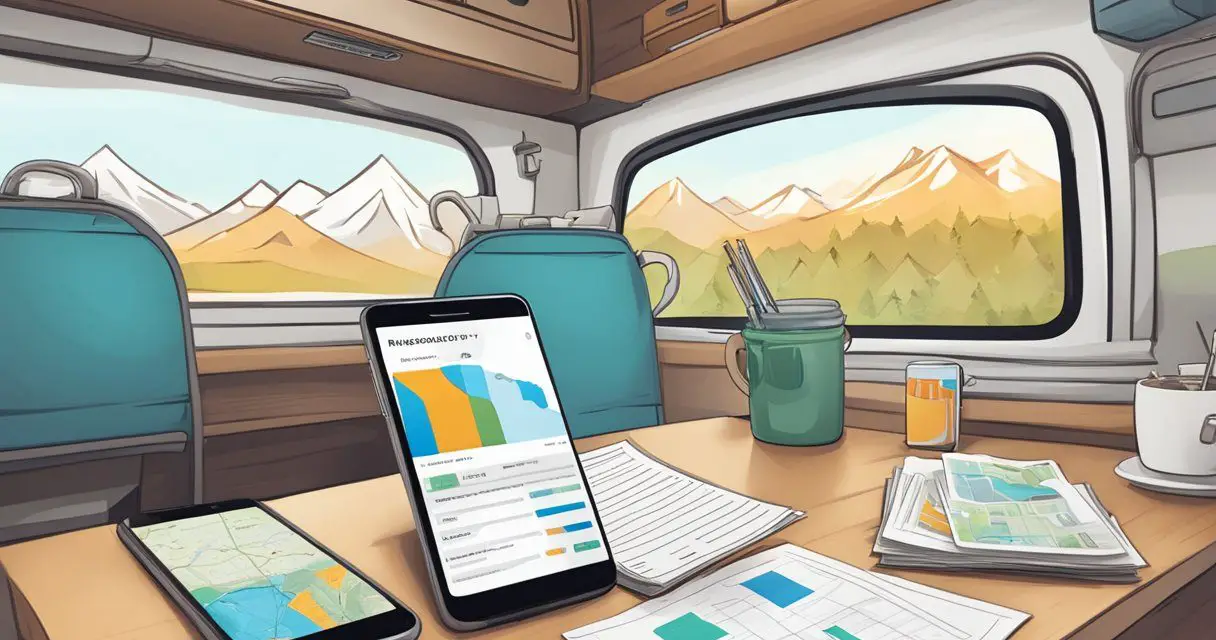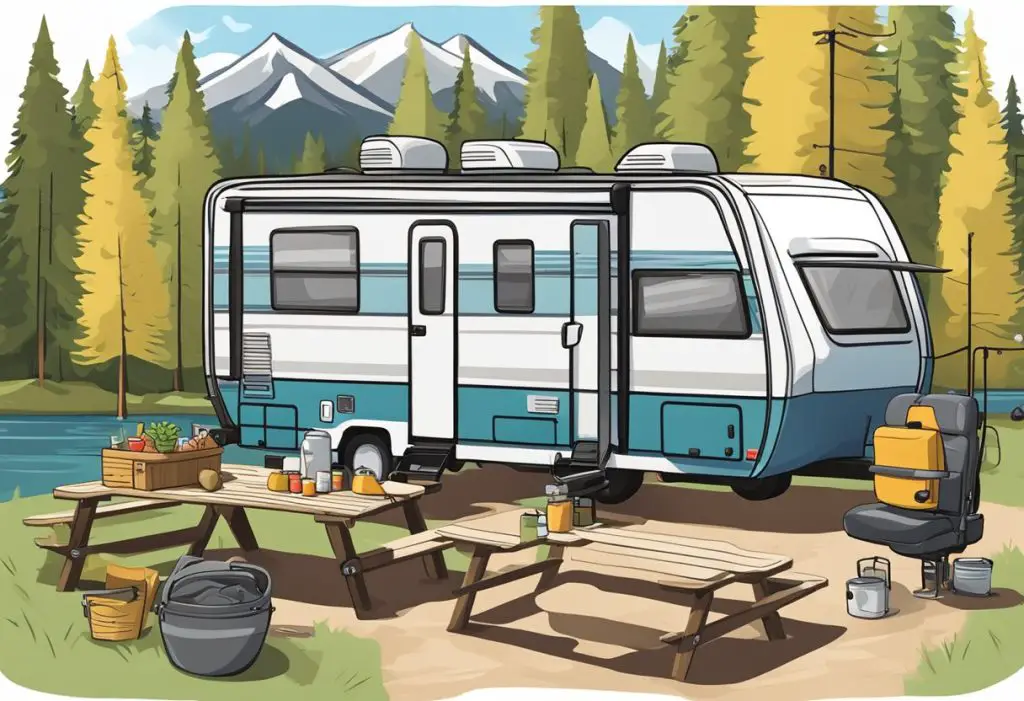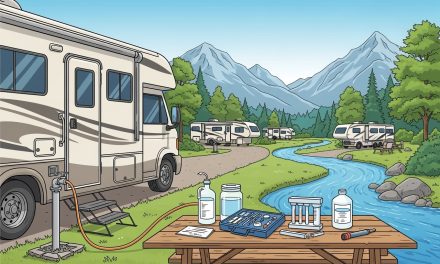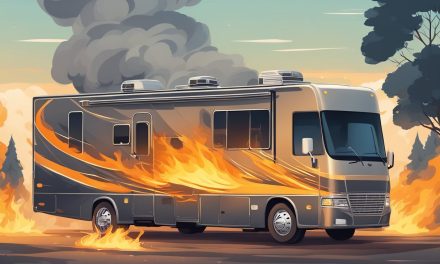If you’re an RVer, managing finances while embracing the open road can be tricky. It’s not uncommon for 80% of RVers to struggle with budgeting, often leading to unexpected financial headaches.
There’s freedom in the lifestyle, but it comes with challenges, especially around money.
Finding the right way to budget can mean the difference between enjoying every mile and stressing over expenses.
Getting a handle on your finances not only eases worries but also makes the journey smoother and more enjoyable.
1) Start with realistic budget goals
When budgeting for living in an RV, it’s important to set goals that match your lifestyle and income.
Think about your monthly expenses, like gas, food, and campground fees. Avoid trying to cut everything to the bone at first.
Life on the road is unpredictable. So, it’s smart to leave room in your budget for surprises like repairs and emergencies. If you make your budget too tight, you’ll run into trouble quickly.
Begin with small, achievable savings targets. For example, aim to save a small amount each week or month. Over time, these small goals can add up and give you a solid financial cushion.
If you find sticking to a budget hard, try using simple methods like the 80/20 rule. This plan can make it easier to manage your money and make you more likely to succeed.
2) Account for Unexpected Expenses
It’s easy to plan for regular bills and necessities, but unexpected expenses can throw your budget off track.
It’s important to set aside a portion of your budget just for these surprises. This way, when something unexpected happens, you’re not scrambling to find the money.
Think about setting up a dedicated fund for emergencies. This fund can cover things like sudden car repairs, medical bills, or surprise fees. A separate savings account can be really helpful here.
Try to add to this fund every month, even if it’s just a small amount. Over time, even a little can add up. Having this backup budget can give you peace of mind as you travel and help prevent money stress.
3) Track every dollar spent
Keeping an eye on every dollar you spend is a key way to stick to your budget.
It might seem like a lot of work, but it really helps you spot where your money goes. You can find small leaks that add up over time.
Use a notebook or an app to jot down your spending. Make it a habit to note purchases right after you make them. Over time, this will become as second nature as checking your messages or social media.
Seeing where your money goes can be an eye-opener. It highlights spending habits you didn’t realize you had. This awareness can help you make better choices in the future and save more money in the long run.
4) Use budgeting apps for ease
Budgeting apps can make managing your money much simpler while you’re on the road.
They automatically keep track of your spending and help you see where your money goes without needing to write everything down.
Imagine freeing up more time for adventures instead of being stuck with spreadsheets. These apps sync with your bank, helping you see your financial state at a glance.
Some apps offer features like goal setting or alerts to keep you on track. They do the work for you by showing spending patterns and areas where you can save.
By using a budgeting app, you get a clearer picture of your finances. This can help reduce stress and make it easier to enjoy your travels.
5) Regularly update your budgeting plan
Keeping your budget updated is essential for staying on track. Life changes, and so do your expenses.
Updating your budget regularly helps you account for unexpected costs or changes in your income.
Don’t wait for the end of the year to make adjustments. Check in with your budget each month. This way, you can make small changes that prevent bigger issues later.
By staying aware of your spending patterns, you can avoid surprises. This makes it easier to save money for trips or emergencies. Updating your budget helps keep your financial goals in focus.
6) Embrace Minimalistic RVing
Living in an RV encourages you to focus on just the essentials. This lifestyle naturally reduces the space you have for extra stuff.
By having fewer things, you can avoid the stress that comes with clutter.
Minimalism in an RV also saves money. You spend less on things you don’t need, allowing you to stick to your budget more easily. Think of it as buying experiences rather than things.
When you live with less, cleaning and maintaining space becomes quicker and easier. You don’t have to spend as much time tidying up, giving you more time to enjoy your travels.
Also, your RV stays lighter, which can improve fuel efficiency. Less weight means less gas needed, saving you even more money on the road.
Start small by getting rid of duplicates and items that no longer serve a purpose. Be mindful of new purchases and ask yourself if they are really necessary. This approach helps in staying on track financially and enjoying a clutter-free space.
Living simply in your RV is about enjoying life with fewer distractions. It’s an opportunity to focus on what truly matters to you.
7) Avoid high-interest RV loans
When you’re hoping to buy an RV, it’s important to watch the interest rate on any loans you consider. A high-interest rate can mean you end up paying a lot more over the life of the loan.
One way to steer clear of high interest is by shopping around. Compare offers from different lenders to find the best rate. Don’t rush into the first deal you see, especially if it’s high.
Improve your credit score if you can. A better score can sometimes get you lower interest rates. Pay bills on time and try to reduce any existing debt. It may take a while, but it’s worth it in the end.
Another tip is to save up for a bigger down payment. The more you put down, the less you’ll have to finance with the loan. This can help reduce the interest you pay. Consider buying a used RV as this might also give you better financing options.
Make sure you understand all the terms before you sign. Look out for any hidden fees or penalties that can increase the cost. Reading carefully can save you from nasty surprises later.
8) Prioritize essential expenses first
When you’re traveling in an RV, it can be tempting to spend on fun activities and keep the adventure going. But the key to successful budgeting is taking care of the must-haves first.
This means making sure you’re covered on necessities like food, fuel, insurance, and site fees.
Before you start mapping out your budget for fun stuff, check off these essentials. It’s like putting first things first, so your travels don’t hit any bumps. If you spend too much on wants and neglect the essentials, it can lead to troubles down the road.
A good rule of thumb is to assign the largest part of your budget to these critical areas. By doing this, you ensure that your travels remain stress-free, allowing you to enjoy your journey without the worry of running low on the important stuff.
9) Plan for RV maintenance costs
Would you like to save this article?
When you own an RV, maintenance is a big part of the deal. Just like a car, it needs care to keep it running. If you plan for these costs, it won’t catch you off guard.
Think about things like oil changes, tire rotations, and brake checks. Also, remember that some repairs can get expensive. It’s smart to set aside money regularly for these surprises.
Do your research on common issues for your RV model. This can help you predict what might need fixing down the road. Knowing this helps you budget better and keeps your RV in top shape.
10) Don’t neglect emergency savings
When you’re on the road in your RV, unexpected costs can pop up quickly. It’s important to have an emergency fund to cover these surprises.
A sudden mechanical problem or medical issue can be expensive if you’re not prepared.
Start by setting aside a portion of your budget specifically for emergencies. Even a small amount each month can add up over time.
This way, you won’t find yourself in a tight spot when the unexpected happens.
Think of your emergency fund as a safety net. It gives you peace of mind, knowing you’re ready for whatever comes your way. Plus, it helps you avoid dipping into money meant for other important expenses.








